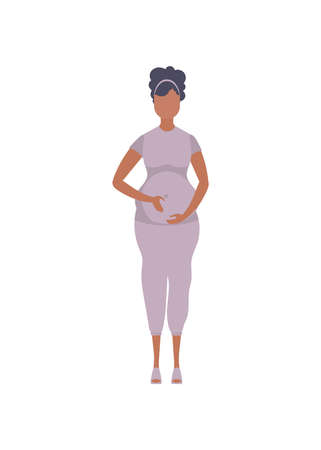1. Understanding Prenatal Weight Gain
Gaining weight during pregnancy is a natural and essential part of supporting your babys development. Your body goes through many changes to create a healthy environment for your growing baby, and weight gain plays a crucial role in this process.
Why Is Weight Gain Important?
Proper weight gain helps ensure that your baby gets enough nutrients to grow and develop. It also supports important changes in your body, such as an increase in blood volume, the growth of the placenta, and the storage of essential nutrients for breastfeeding.
Where Does the Extra Weight Go?
The weight you gain during pregnancy is distributed across different areas of your body. Here’s a general breakdown:
| Body Component | Estimated Weight |
|---|---|
| Baby | 6-9 lbs (2.7-4 kg) |
| Placenta | 1-2 lbs (0.5-1 kg) |
| Amniotic Fluid | 2-3 lbs (0.9-1.4 kg) |
| Increased Blood Volume | 3-4 lbs (1.4-1.8 kg) |
| Maternal Fat Stores | 5-9 lbs (2.3-4 kg) |
| Tissue Growth (Uterus & Breasts) | 3-5 lbs (1.4-2.3 kg) |
The Right Amount of Weight Gain
The amount of weight you should gain depends on your pre-pregnancy body mass index (BMI). Here are the general guidelines:
| BMI Category | Total Recommended Weight Gain |
|---|---|
| Underweight (BMI < 18.5) | 28-40 lbs (12.7-18.1 kg) |
| Normal Weight (BMI 18.5-24.9) | 25-35 lbs (11.3-15.9 kg) |
| Overweight (BMI 25-29.9) | 15-25 lbs (6.8-11.3 kg) |
| Obese (BMI ≥ 30) | 11-20 lbs (5-9 kg) |
A Healthy Approach to Pregnancy Weight Gain
The key to healthy prenatal weight gain is focusing on balanced nutrition and listening to your bodys needs. Eating nutrient-dense foods, staying active with doctor-approved exercises, and keeping track of your weight with regular prenatal checkups can help ensure a healthy pregnancy for both you and your baby.
2. Recommended Weight Gain Guidelines
Understanding how much weight gain is considered healthy during pregnancy depends on your pre-pregnancy Body Mass Index (BMI). Gaining the right amount of weight supports your babys growth and development while also helping you stay healthy.
How Much Weight Should You Gain?
The following guidelines from the Institute of Medicine (IOM) provide recommendations based on pre-pregnancy BMI:
| BMI Category | BMI Range | Total Recommended Weight Gain | Recommended Weekly Gain (2nd & 3rd Trimester) |
|---|---|---|---|
| Underweight | <18.5 | 28-40 lbs | 1-1.3 lbs |
| Normal Weight | 18.5-24.9 | 25-35 lbs | 0.8-1 lb |
| Overweight | 25-29.9 | 15-25 lbs | 0.5-0.7 lb |
| Obese | >30 | 11-20 lbs | 0.4-0.6 lb |
Why Does Pre-Pregnancy BMI Matter?
Your pre-pregnancy BMI helps determine how much weight you need to gain for a healthy pregnancy. Gaining too little may increase the risk of premature birth, while gaining too much can lead to complications like gestational diabetes or high blood pressure.
Weight Gain for Twin Pregnancies
If youre expecting twins, the recommended weight gain is higher:
- Normal weight: 37-54 lbs
- Overweight: 31-50 lbs
- Obese: 25-42 lbs
Your healthcare provider can help you set a personalized weight gain goal based on your individual health needs.
Tracking Your Weight Gain
Regular prenatal checkups allow your doctor to monitor your weight gain and ensure it stays within a healthy range. If youre concerned about gaining too much or too little, discuss it with your healthcare provider for personalized guidance.
The key is to focus on balanced nutrition, regular physical activity (as advised by your doctor), and listening to your bodys needs throughout pregnancy.

3. Risks of Gaining Too Much or Too Little
Gaining the right amount of weight during pregnancy is important for both mom and baby. If you gain too much or too little, it can lead to complications that affect your health and your babys well-being. Let’s take a closer look at the risks associated with excessive or insufficient weight gain.
Risks of Gaining Too Much Weight
Packing on extra pounds beyond the recommended range may increase the risk of several complications:
- Gestational diabetes: Excessive weight gain raises the chances of developing gestational diabetes, which can lead to larger birth weight and delivery complications.
- High blood pressure: Gaining too much weight increases the risk of preeclampsia, a serious condition that affects both mother and baby.
- C-section delivery: Larger babies often require cesarean deliveries, which come with longer recovery times and potential complications.
- Difficult postpartum weight loss: Extra pregnancy weight can be harder to lose after birth, increasing the risk of long-term obesity.
Risks of Gaining Too Little Weight
If you don’t gain enough weight, your baby might not get the necessary nutrients for proper growth and development. Some potential risks include:
- Preterm birth: Not gaining enough weight increases the likelihood of delivering your baby too early, which can lead to health challenges.
- Low birth weight: Babies born underweight may face difficulties regulating body temperature and have weaker immune systems.
- Poor fetal development: Inadequate nutrition during pregnancy can impact brain development and overall health.
- Difficult breastfeeding initiation: Underweight babies may struggle with latching and feeding effectively.
Potential Complications Based on Weight Gain
| Weight Gain Category | Potential Risks for Mom | Potential Risks for Baby |
|---|---|---|
| Too Much | – Gestational diabetes – High blood pressure (preeclampsia) – Increased chance of C-section – Difficulty losing postpartum weight |
– Large birth weight (macrosomia) – Higher risk of childhood obesity – Increased chance of birth injuries |
| Too Little | – Nutritional deficiencies – Increased fatigue – Higher risk of preterm labor |
– Low birth weight – Poor organ development – Difficulty breastfeeding |
How to Stay Within a Healthy Range
The best way to maintain healthy prenatal weight gain is by following a balanced diet, staying active (as recommended by your doctor), and keeping up with regular prenatal checkups. If youre unsure about how much weight you should be gaining, talk to your healthcare provider—they can help create a plan tailored to your specific needs.
4. Managing a Healthy Weight Gain
Gaining the right amount of weight during pregnancy is important for both you and your baby’s health. While every pregnancy is different, maintaining a balanced approach to nutrition and activity can help you stay within a healthy weight range. Here are some practical tips to guide you through this journey.
Tips on Balanced Nutrition
Eating a well-rounded diet ensures that both you and your baby get essential nutrients. Focus on consuming nutrient-dense foods that provide vitamins, minerals, and energy without excessive empty calories.
Key Nutrients for Pregnancy
| Nutrient | Benefits | Food Sources |
|---|---|---|
| Folic Acid | Supports fetal brain and spine development | Leafy greens, citrus fruits, fortified cereals |
| Protein | Aids in babys growth and tissue development | Lean meats, eggs, beans, tofu |
| Calcium | Essential for strong bones and teeth | Dairy products, almonds, leafy greens |
| Iron | Prevents anemia and supports oxygen transport | Red meat, spinach, lentils, fortified cereals |
| Healthy Fats | Aids in brain development | Avocados, nuts, olive oil, salmon |
Staying Active During Pregnancy
Regular physical activity can help manage weight gain, boost mood, and prepare your body for labor. Always consult your healthcare provider before starting a new exercise routine.
Safe Exercises for Pregnant Women
- Walking: A low-impact way to stay active.
- Prenatal Yoga: Helps with flexibility and relaxation.
- Swimming: Gentle on joints while providing full-body movement.
- Stationary Biking: A safer alternative to outdoor cycling.
- Prenatal Strength Training: Light weights can help maintain muscle tone.
Working With Your Healthcare Provider
Your doctor or midwife is your best resource for managing weight gain during pregnancy. They can provide personalized recommendations based on your medical history and unique needs.
When to Consult Your Doctor
- If youre gaining too much or too little weight according to recommendations.
- If you experience sudden or rapid weight gain (which could indicate complications).
- If you have difficulty maintaining a balanced diet due to nausea or food aversions.
- If youre unsure about safe exercise routines for your pregnancy stage.
Prenatal weight gain is a natural part of pregnancy, but managing it properly ensures better health outcomes for both you and your baby. By focusing on nutrition, staying active, and working closely with your healthcare provider, you can navigate this journey with confidence.
5. When to Seek Professional Guidance
Gaining the right amount of weight during pregnancy is important for both your health and your baby’s development. But how do you know if you’re on the right track? If youre unsure whether youre gaining too much or too little, it might be time to seek professional advice.
Signs You Should Talk to Your Doctor or a Nutritionist
If you experience any of the following signs, consider reaching out to your healthcare provider for personalized guidance:
| Sign | What It Could Mean |
|---|---|
| Sudden or rapid weight gain | This could indicate fluid retention, which may be a sign of preeclampsia or other health concerns. |
| No weight gain for several weeks | If youre not gaining weight as expected, it could mean that your baby isn’t getting enough nutrients. |
| Losing weight after the first trimester | Mild weight loss in the first trimester due to morning sickness is normal, but losing weight later may signal a nutritional issue. |
| Gaining more than the recommended amount | This could increase the risk of gestational diabetes, high blood pressure, and complications during delivery. |
| Trouble managing cravings or appetite changes | A nutritionist can help create a meal plan that balances your needs without excessive weight gain. |
The Role of Your Healthcare Provider
Your doctor or midwife will monitor your weight throughout pregnancy and can provide recommendations based on your medical history and overall health. They may also refer you to a nutritionist if you need specialized dietary advice.
Nutritional Counseling for a Healthy Pregnancy
A registered dietitian or nutritionist can help you develop a balanced eating plan tailored to your specific needs. They can address concerns such as managing nausea, ensuring proper nutrient intake, and maintaining steady weight gain.
When to Act Quickly
If you experience extreme swelling, severe headaches, dizziness, or vision changes along with unusual weight fluctuations, contact your healthcare provider immediately. These symptoms could indicate a serious condition requiring urgent care.
Prenatal weight gain varies for every woman, so don’t hesitate to ask for guidance if something feels off. Your health team is there to support you every step of the way!


